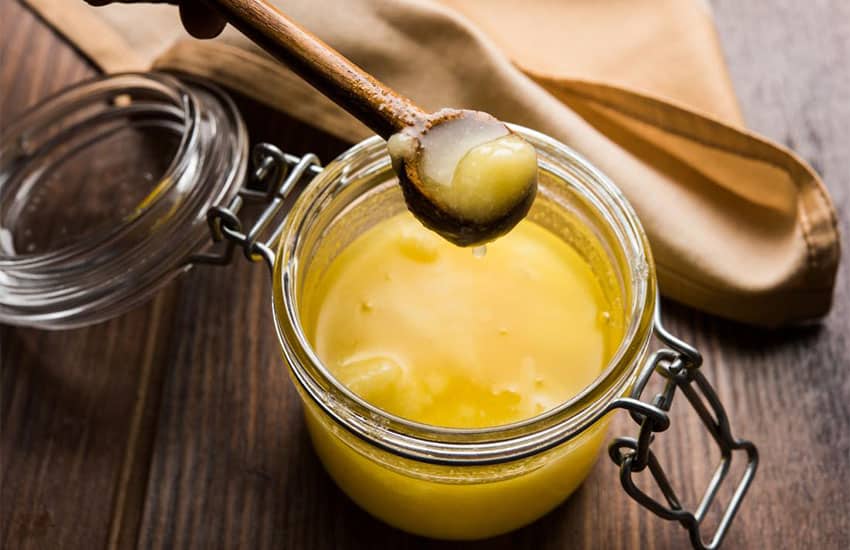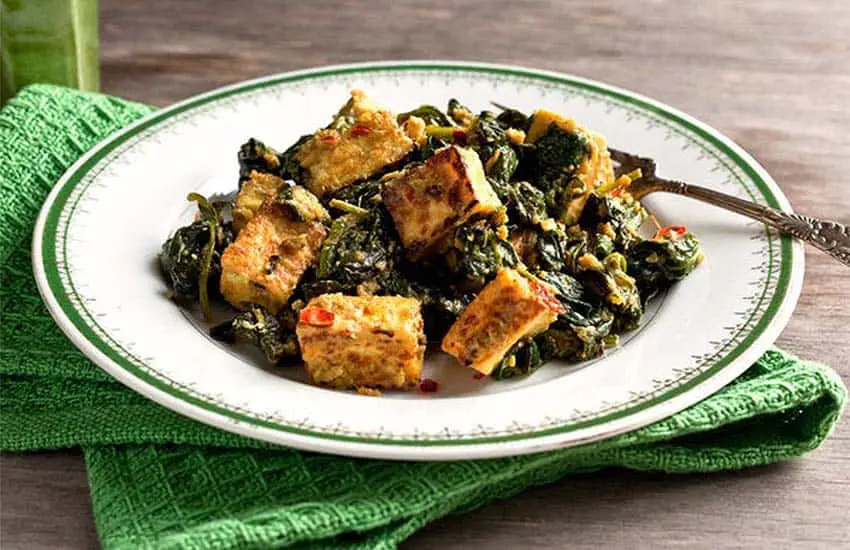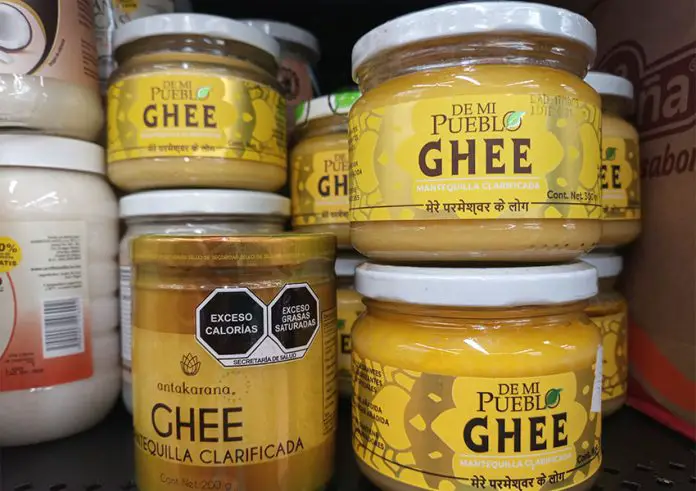The simple answer is that it’s pure butter fat, which is why it tastes soooo good. (Whether it’s good FOR you is another story that we’ll get to in a minute.)
Ghee is butter with the milk solids removed (i.e., a lactose-free fat). By simmering butter at a low temperature, the milk solids sink to the bottom of the pan, the water evaporates, and you’re left with clarified butter. (Read a history of Indian ghee-making here.)
That leaves the most delicious part: the fat, which is, unfortunately, about 50% saturated — the most unhealthy kind if you’re concerned about LDL cholesterol or heart disease.
Let me say that I don’t like to be afraid of food and never have been. (Except some organ meats, but that’s a different kind of fear!) A recent situation with my heart health, though, has made me not exactly afraid of food but more aware of what I’m eating. So ghee is on my no-no list (or at least a not-very-often list) right now.
On the other hand, those on lactose-free diets will find ghee just what the doctor ordered. A host of celebrities have embraced it as a wonder food, and it’s been used in India for thousands of years.
In short, there’s no easy answer as to whether ghee is a healthy fat or not. So do the research and decide what makes sense to you.

I’ve cooked (and eaten) a lot of Indian food, so ghee isn’t an unknown to me. It’s luxurious in flavor, mouthfeel and aroma, and besides being an essential in Indian cooking, it’s a traditional part of worship and ritual in that culture.
In the West, at about the same time as interest in Ayurvedic medicine grew, “lactose-free” diets did too, creating a perfect storm for ghee to rise to the top (hah) of the newest trendy healthy foods. Even here in Mexico you can find jars of this “liquid gold” in the big-box supermarkets.
Ghee is easy to make (recipe below), lasts a long time, and a little goes a long way. Store-bought ghee is pricey, but again, you’ll only be using a spoonful or two in most recipes.
One caveat: Mexican regulations allow butter to contain a certain amount of vegetable oil and not be labeled as such; I recommend using imported butter (like Président from France or the Danish brand Lurpak) or organic butter if you can.
Ghee’s high smoke point makes it perfect for deep-frying or sauteing basically anything you would regularly use oil for — think potatoes, shrimp, chicken, scrambled eggs. Its delightful nutty flavor is great drizzled on naan or chapatis (or warm corn or flour tortillas!), popcorn, rice or grilled veggies. If you’re looking to jazz up some old standards, a little bit of ghee might be just the thing.
Ghee
- 1 lb. (or more) unsalted butter, organic if possible
Cut butter into chucks and place in heavy-bottomed saucepan over low heat. Allow to melt without stirring. Once the butter melts and the milk solids begin to cook, it will start to sputter and a white foam will slowly rise to the surface, usually in 5–8 minutes.
Using a large spoon, carefully scoop the foam off the surface (without touching the base of the pan) and discard. Once you have scooped pretty much all the foam off the melted butter, you should see an almost clear liquid with golden browned milk solids settled at the bottom of the pan.
About 30 seconds after this stage, you will again see very faint foam forming on the ghee’s surface. It will be less dense than the previous foam — more like a thin cloud of small, clear bubbles covering the surface of the ghee. When you see this second foam form, it’s time to turn the heat off. Take ghee off the heat, and let it sit for 10 minutes.
Place a fine mesh sieve layered with cheesecloth or a paper coffee filter over a clean, dry mason jar. Pour the ghee through the sieve. Let ghee cool completely before putting the lid on the jar. Store in a dry place at room temperature or refrigerate. (Remember that ghee will solidify in cooler temps without affecting the flavor.)

Saag Paneer / Saag Tofu
- 1 lb. (about 8 packed cups) fresh baby spinach*
*If using chopped frozen spinach, squeeze out excess liquid and drain well - 2 Tbsp. ghee
- 8 oz. paneer or firm tofu, cut into 1-by-½-inch pieces
- ½ cup minced onion
- Salt and pepper
- 1 Tbsp. grated peeled ginger
- 2 tsp. grated garlic (about 3 cloves)
- 1 serrano chile, minced
- ½ tsp. ground coriander powder
- ¼ tsp. ground cumin
- ½ cup heavy cream
In a food processor, working in batches, pulse spinach until minced but not puréed. You should have about 3 packed cups of minced spinach.
Heat 1 Tbsp. ghee over medium in a large nonstick skillet. Add paneer and cook, turning occasionally, until golden all over, 5–7 minutes.
Using tongs, carefully transfer cheese to a plate, leaving as much ghee as possible in the skillet. If using tofu, dry thoroughly with paper towels, cut into cubes and cook in ghee as above.
Reduce heat to medium-low, add remaining 1 Tbsp. ghee and the onion; season with salt and pepper. Cook, stirring occasionally, until softened but not browned, about 5 minutes.
Add ginger, garlic and chile, and cook 1 minute, stirring occasionally. Stir in coriander and cumin. Add spinach and ½ cup water; increase heat to medium. Season with salt and pepper again and cook, stirring occasionally, until spinach is completely soft and most liquid is absorbed, about 8 minutes.
Stir in heavy cream and paneer/tofu. Taste and adjust seasoning. Serve immediately over Basmati rice.
Janet Blaser is the author of the best-selling book, Why We Left: An Anthology of American Women Expats, featured on CNBC and MarketWatch. She has lived in Mexico since 2006. You can find her on Facebook.
